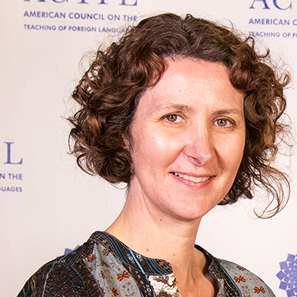Skip to content
Selected Publications
- Drewelow, I. (2023). Dissonance and self-reflections: Decentering assumptions to foster learners’ cognitive flexibility. Intercultural Communication Education, 6(3), 78-91.
- Drewelow, I. & Granja Ibarreche, X. (2022). Grit and resilience in WLSPs: The potential of blending translation and indirect service learning. Global Advances in Business and Communication, Vol. 10, Article 4.
- Drewelow, I. & Granja Ibarreche, X. (2021). Developing students’ solidarity disposition: A case for translation in Community-Based Service Learning. Foreign Language Annals, 54(3), 800-822.
- Drewelow, I. (2020). A positive psychology perspective on designing a technology-mediated learning experience: Engagement and personal development. Journal for the Psychology of Language Learning, 2(1), 90-115.
- Drewelow, I. & Finney, S. (2020). Developing intercultural empathy through a strategy-based simulation in intermediate Spanish. The Language Learning Journal, 48(6), 754-767.
- Drewelow, I., Koronkiewicz, B., & Range, R. (2019). Rethinking and shifting discourses and practices of “testing” – From accuracy to engagement with situated contexts. In B. Dupuy & K. Michelson (Eds.), Pathways to Paradigm Change: Critical Examinations of Prevailing Discourses and Ideologies in Second Language Education (pp. 53-82). Boston, MA: Cengage.
- Drewelow, I. (2017). A socio-constructivist approach to developing intercultural empathy. In S. Dubreuil & S. L. Thorne (Eds.), Engaging the world: Social pedagogies and language learning (pp. 255-265). Boston, MA: Cengage.
- Drewelow, I., & Mitchell, C. (2015). An exploration of learners’ conceptions of language, culture, and learning in advanced-level Spanish courses. Language, Culture and Curriculum, 28(3), 243-256.
- Drewelow, I. (2015). Liberté et République: Using familiar constructs to cultivate learners’ awareness of diverse perspectives. The Language Educator, 10(3), 48-50.
- Drewelow, I. (2015). Developing cross-cultural awareness at the introductory level through stereotypes and digital storytelling. The French Review, 88(3), 71-90.
- Drewelow, I. (2013). Exploring graduate teaching assistants’ perspectives on their roles in a foreign language hybrid course. System, 41(4), 1006-1022.
- Drewelow, I. (2013). Impact of instruction on shaping or reshaping stereotypical cultural representations in an introductory French course. Foreign Language Annals, 46(2), 157-174.
- Drewelow, I. (2012). Learners’ perceptions of culture in a first-semester foreign language course. L2 Journal, 4(2), 283-302.
- Drewelow, I. (2012). Twitter in the teaching methods course: Foreign language graduate teaching assistants’ perspectives. Paper accepted for publication. The JALTCALL Journal, 8(2), 129-143.
- Drewelow, I. (2011). Learners’ selective perceptions of information during instructed learning in French: Consequences. Modern Language Journal, 95(s1), 27-41.
- Drewelow, I. (2011). American learners of French and their stereotypes of the French language and people: A survey and its implications for teaching. The French Review, 84(4), 748-762.
- Drewelow, I., & Theobald, A. (2007). A Comparison of the Attitudes of Learners, Teachers and Native French Speakers about the Pronunciation of French: An Exploratory Study. Foreign Language Annals, 40(3), 491-520.
